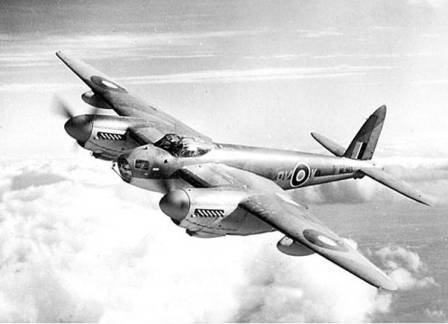 Two spitfires have just flown over our offices at The Spectator, to commemorate the
Battle of Britain. The aircraft are deservedly iconic, but it’s a bit of shame that over the years they’ve eclipsed the de Havilland Mosquito in the public memory. They were developed too late for the Battle
itself, but were incredible aircraft when they were deployed. And, crucially, privately-developed.
Two spitfires have just flown over our offices at The Spectator, to commemorate the
Battle of Britain. The aircraft are deservedly iconic, but it’s a bit of shame that over the years they’ve eclipsed the de Havilland Mosquito in the public memory. They were developed too late for the Battle
itself, but were incredible aircraft when they were deployed. And, crucially, privately-developed.
In 1937, the British had only 46 bombers where the Germans had about 800 – and the speed at which the RAF developed was extraordinary. The battle of Britain exposed the weaknesses in the Luftwaffe – and Nazi procurement policy. Hitler relied on a vast, unwieldy bureaucracy to produce a heavy bomber and it failed him. After the Battle of Britain, Hitler headed off to Russia where he found that – as Paul Johnson said in Modern Times – he was “fighting a Forties war with late-Thirties weaponry, and not even enough of that.” Hitler’s defence procurement system was made even less effective by the fact that he’d supplanted the chief officials with loyalists from his National Socialist party. In spite of all that supremacy he’d had just a few years earlier, the system could not respond to what he wanted.
In Britain, the de Havilland Aircraft Company was finally winning its argument that a bomber did not need to be armed if it was fast enough (the MoD had been unpersuaded, and had rejected it in
1938). But, eventually, they saw the wisdom in this private procurement and, in 1942, the Mosquito was deployed in force – becoming the fastest aircraft in the world. I’ll leave the final word to Goering:
“In 1940 I could at least fly as far as Glasgow in most of my aircraft, but not now! It makes me furious when I see the Mosquito. I turn green and yellow with envy. The British, who can afford aluminium better than we can, knock together a beautiful wooden aircraft that every piano factory over there is building, and they give it a speed which they have now increased yet again. What do you make of that? There is nothing the British do not have. They have the geniuses and we have the nincompoops. After the war is over I’m going to buy a British radio set – then at least I’ll own something that has always worked.”







Comments